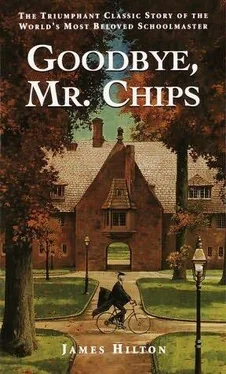When Chips remembered things like this he often felt that he would write them down and make a book of them; and during his years at Mrs. Wickett's he sometimes went even so far as to make desultory notes in an exercise book. But he was soon brought up against difficulties—the chief one being that writing tired him, both mentally and physically. Somehow, too, his recollections lost much of their flavour when they were written down; that story about Rushton and the sack of potatoes, for instance—it would seem quite tame in print, but Lord, how funny it had been at the time! It was funny, too, to remember it; though perhaps if you didn't remember Rushton... and who would, anyway, after all those years? It was such a long time ago... Mrs. Wickett, did you ever know a fellow named Rushton? Before your time, I dare say... went to Burma in some government job... or was it Borneo?... Very funny fellow, Rushton... And there he was, dreaming again before the fire, dreaming of times and incidents in which he alone could take secret interest. Funny and sad, comic and tragic, they all mixed up in his mind, and some day, however hard it proved, he would sort them out and make a book of them...
8
And there was always in his mind that spring day in ninety-eight when he had paced through Brookfield village as in some horrifying nightmare, half struggling to escape into an outside world where the sun still shone and where everything had happened differently. Young Faulkner had met him there in the lane outside the School. "Please, sir, may I have the afternoon off? My people are coming up."
"Eh? What's that? Oh yes, yes..."
"Can I miss Chapel, too, sir?"
"Yes... yes..."
"And may I go to the station to meet them?"
He nearly answered: "You can go to blazes for all I care. My wife is dead and my child is dead, and I wish I were dead myself."
Actually he nodded and stumbled on. He did not want to talk to anybody or to receive condolences; he wanted to get used to things, if he could, before facing the kind words of others. He took his fourth form as usual after call-over, setting them grammar to learn by heart while he himself stayed at his desk in a cold, continuing trance. Suddenly someone said: "Please, sir, there are a lot of letters for you."
So there were; he had been leaning his elbows on them; they were all addressed to him by name. He tore them open one after the other, but each contained nothing but a blank sheet of paper. He thought in a distant way that it was rather peculiar, but he made no comment; the incident gave hardly an impact upon his vastly greater preoccupations. Not till days afterward did he realise that it had been a piece of April foolery.
They had died on the same day, the mother and the child just born; on April 1, 1898.
9
Chips changed his more commodious apartments in School House for his old original bachelor quarters. He thought at first he would give up his housemastership, but the Head persuaded him otherwise; and later he was glad. The work gave him something to do, filled up an emptiness in his mind and heart. He was different; everyone noticed it. Just as marriage had added something, so did bereavement; after the first stupor of grief he became suddenly the kind of man whom boys, at any rate, unhesitatingly classed as "old." It was not that he was less active; he could still knock up a half century on the cricket field; nor was it that he had lost any interest or keenness in his work. Actually, too, his hair had been greying for years; yet now, for the first time, people seemed to notice it. He was fifty. Once, after some energetic fives, during which he had played as well as many a fellow half his age, he overheard a boy saying: "Not half bad for an old chap like him."
Chips, when he was over eighty, used to recount that incident with many chuckles. "Old at fifty, eh? Umph—it was Naylor who said that, and Naylor can't be far short of fifty himself by now! I wonder if he still thinks that fifty's such an age? Last I heard of him, he was lawyering, and lawyers live long—look at Halsbury—umph—Chancellor at eighty-two, and died at ninety-nine. There's an—umph—age for you! Too old at fifty—why, fellows like that are too young at fifty... I was myself... a mere infant..."
And there was a sense in which it was true. For with the new century there settled upon Chips a mellowness that gathered all his developing mannerisms and his oft-repeated jokes into a single harmony. No longer did he have those slight and occasional disciplinary troubles, or feel diffident about his own work and worth. He found that his pride in Brookfield reflected back, giving him cause for pride in himself and his position. It was a service that gave him freedom to be supremely and completely himself. He had won, by seniority and ripeness, an uncharted no-man's-land of privilege; he had acquired the right to those gentle eccentricities that so often attack schoolmasters and parsons. He wore his gown till it was almost too tattered to hold together; and when he stood on the wooden bench by Big Hall steps to take call-over, it was with an air of mystic abandonment to ritual. He held the School List, a long sheet curling over a board; and each boy, as he passed, spoke his own name for Chips to verify and then tick off on the list. That verifying glance was an easy and favourite subject of mimicry throughout the School—steel-rimmed spectacles slipping down the nose, eyebrows lifted, one a little higher than the other, a gaze half rapt, half quizzical. And on windy days, with gown and white hair and School List fluttering in uproarious confusion, the whole thing became a comic turn sandwiched between afternoon games and the return to classes.
Some of those names, in little snatches of a chorus, recurred to him ever afterward without any effort of memory... Ainsworth, Attwood, Avonmore, Babcock, Baggs, Barnard, Bassenthwaite, Battersby, Beccles, Bedford-Marshall, Bentley, Best...
Another one:—
... Unsley, Vailes, Wadham, Wagstaff, Wallington, Waters Primus, Waters Secundus, Watling, Waveney, Webb...
And yet another that comprised, as he used to tell his fourth-form Latinists, an excellent example of a hexameter:— ... Lancaster, Latton, Lemare, Lytton-Bosworth, MacGonigall, Mansfield...
Where had they all gone to, he often pondered; those threads he had once held together, how far had they scattered, some to break, others to weave into unknown patterns? The strange randomness of the world beguiled him, that randomness which never would, so long as the world lasted, give meaning to those choruses again.
And behind Brookfield, as one may glimpse a mountain behind another mountain when the mist clears, he saw the world of change and conflict; and he saw it, more than he realised, with the remembered eyes of Kathie. She had not been able to bequeath him all her mind, still less the brilliance of it; but she had left him with a calmness and a poise that accorded well with his own inward emotions. It was typical of him that he did not share the general jingo bitterness against the Boers. Not that he was a pro-Boer—he was far too traditional for that, and he disliked the kind of people who were pro-Boers; but still, it did cross his mind at times that the Boers were engaged in a struggle that had a curious similarity to those of certain English history-book heroes—Hereward the Wake, for instance, or Caractacus. He once tried to shock his fifth form by suggesting this, but they only thought it was one of his little jokes.
However heretical he might be about the Boers, he was orthodox about Mr. Lloyd George and the famous Budget. He did not care for either of them. And when, years later, L. G. came as the guest of honour to a Brookfield Speech Day, Chips said, on being presented to him: "Mr. Lloyd George, I am nearly old enough—umph—to remember you as a young man, and—umph—I confess that you seem to me—umph—to have improved—umph—a great deal." The Head standing with them, was rather aghast; but L. G. laughed heartily and talked to Chips more than to anyone else during the ceremonial that followed.
Читать дальше











